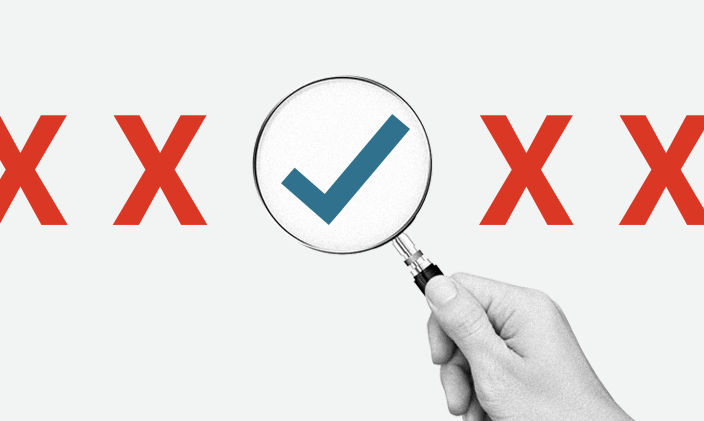Career Guide
Accountant and auditor
If you excel in analytical thinking, have a strong financial acumen, demonstrate precision and possess a keen awareness of compliance, you could chart a path towards a rewarding career as an accountant or auditor.
If you enjoy planning, organizing, managing deadlines and seeing a project through from start to finish, you may excel in a career as a project manager.Ěý
If you excel in analytical thinking, have a strong financial acumen, demonstrate precision and possess a keen awareness of compliance, you could chart a path towards a rewarding career as an accountant or auditor.
Career overview
´ˇ˛ÔĚýĚýis a business professional engaged by individuals, companies and government agencies to act as a financial detective, coach and advisor. This role involves meticulous review of clients’Ěýfinancial records, tax preparation, budgeting, financial reporting and ensuring compliance with regulations. Accountants work to ensure the accuracy of financial records, assess financial risks and solve problems as they arise. Beyond number crunching, they leverage technology and their expertise to optimize financial operations and provide strategic advice. Upholding strict ethical standards, accountants are the guardians of financial health for both corporate and private clients.
There are of accounting professionals, according to the Bureau of Labor Statistics (BLS):Ěý
- Government accountantsĚýanalyze financial documents for government agencies and verify revenues are managed appropriately and lawfully. They may also be responsible for auditing private entities under government regulation or taxation, financial reporting and management accounting, which allows agencies to understand the financial implications of their decisions.
- Management accountants — also known as cost, corporate, industrial, managerial, or private accountants — use accounting and financial data to help companies make strategic decisions. These accountants work to gather and analyze information for internal use, such as budgets and performance reviews, to assist managers and potentially help plan business costs. Additionally, they may collaborate with financial managers to guide financial investment decisions.
- Public accountants manage a variety of accounting, auditing, tax and consulting tasks for diverse clients including corporations, governments, individuals and nonprofits. They specialize in areas like tax advisory, forensic accounting and personal financial guidance. They may also be required to sign important documents, like annual and quarterly reports submitted to the Securities and Exchange Commission (SEC), for publicly traded companies.
Auditors, on the other hand, play a critical role in the financial ecosystem by evaluating and verifying an organization’s financial statements to ensure accuracy and compliance with applicable laws and standards. Their primary responsibilities include examining financial records, conducting tests of transactions and assessing internal controls to identify any discrepancies or areas of risk. They prepare detailed reports outlining their findings and may also provide recommendations for improving financial practices and operational efficiencies. Through their work, auditors help to enhance the integrity of financial reporting, instilling confidence in stakeholders and promoting transparency in the business environment.
Auditors can work in various specializations or specific industries, playing a unique role in evaluating an organization’s financial and operational integrity. These are some of the different types of roles available to individuals in this field:
- Internal auditors: These professionals work within an organization, examining its internal processes, policies and financial practices. Their primary goal is to assess risk management, internal controls and governance. By conducting regular audits, they provide insights and recommendations to improve efficiency and compliance with regulations, helping the organization minimize risks and enhance its operational effectiveness.
- External auditors: Typically employed by independent accounting firms, external auditors review an organization’s financial statements and practices to ensure they adhere to applicable standards and regulations. Their work involves an impartial evaluation of financial reports, often culminating in an audit opinion that provides reassurance to stakeholders regarding the accuracy and reliability of the organization's financial performance. The independence of external auditors is vital as it helps to maintain public trust in the financial reporting process.
What to expect
Salary range
$62 - 103K
$62KĚý ĚýĚý
$103KĚý ĚýĚý
In 2023, accountants and auditors within the 25th and 75th percentilesĚý, according to BLS nationwide statistics.[1]
Projected growth (2023-2033)
91,400 jobs
Employment in this field is projected to between 2023 and 2033, BLS reports. It is expected that 1,653,400 accountants and auditors will be present in the workforce by 2033.[1]
Education required
Bachelor's degree
Related job titles
Bookkeeping, accounting and auditing clerk
Budget analyst
Cost estimator
Financial analyst
Financial advisor
[1]ĚýThe salary ranges are not specific to students or graduates of °®ÎŰ´«Ă˝. The salary ranges, job opportunities and outcomes presented represent the larger job category, which includes the particular job title. Actual outcomes vary based on multiple factors, including prior work experience, geographic location and other factors specific to the individual. °®ÎŰ´«Ă˝ does not guarantee employment, salary level or career advancement. BLS data is geographically based. Information for a specific state/city can be researched on the BLS website.Ěý The BLS Projected Growth for 2023-2033 is published by the US Bureau of Labor Statistics. This data reflects the BLS’ projections of national (not local) conditions. These data points are not specific to °®ÎŰ´«Ă˝ students or graduates.
About our source
The Bureau of Labor Statistics (BLS) is an agency of the United States Department of Labor that serves as part of the U.S. Federal Statistical System. Find out more:
What’s the difference: Accountants vs. auditors
While accountants and auditors both operate in finance, their roles are quite different. Accountants prepare, analyze and report financial records, focusing on accuracy and compliance with regulations, while auditors evaluate these records to ensure their integrity and adherence to standards. Auditors assess financial practices and internal controls through independent reviews, highlighting the distinct yet collaborative functions of both professions within the financial landscape.
In the accountant and auditor careers, you can explore diverse work environments, with employment opportunities spanning across various industries in both for-profit and nonprofit organizations. in these professions include internal auditor, audit manager,Ěý certified public accountant (CPA), cost accountant and tax accountant.Ěý
Over 1.6 million accountants and auditors were in 2023, BLS reports. Companies specializing in accounting, tax preparation, bookkeeping and payroll services were . The for accountants and auditors is likely to remain high due to increasing globalization, a thriving economy and the intricate landscape of tax and regulatory policies, according to BLS.
Challenges
Pursuing an auditing or accounting career presents several challenges that professionals must navigate. One of the primary obstacles is the constant evolution of regulations and standards, which necessitates ongoing education and adaptability to remain compliant and relevant in the field. Additionally, the work can often be stressful, especially during peak seasons like tax time or year-end audits, where deadlines loom and the demand for accuracy is paramount. Accountants and auditors must also possess strong analytical skills to interpret complex financial data, and their responsibilities often include communicating findings to clients or management, requiring both technical knowledge and effective interpersonal skills. Balancing these demands while maintaining a high standard of work can be daunting, making resilience and time management crucial attributes for success in these careers.
Advantages
Despite these challenges, there are numerous advantages that make the auditor and accountant careers rewarding. For one, professionals in this field often enjoy job stability and demand, as businesses of all sizes require skilled accountants and auditors to navigate financial complexities and ensure compliance. Additionally, the diversity of industries—from corporate finance to government agencies—provides a wide range of career opportunities and the potential for upward mobility. Also, accounting and auditing careers often come with competitive salaries and benefits, reflecting the expertise and qualifications required. Lastly, the analytical and problem-solving skills developed in this field can be applied in various aspects of business decision-making, contributing to both personal and professional growth.
Ěý
Career-relevant skills
In today's competitive job market, possessing the right skills is essential for standing out, especially in the auditor and accountant career paths. Employers are on the lookout for candidates who not only bring technical expertise but also a suite of complementary skills that drive success. These are the top skills currently sought after in candidates for accountant and auditor roles:
- Accounting
- Auditing
- Finance
- Financial statements
- Generally accepted accounting principles
- General ledger
- Internal controls
- Month-end closing
- External auditing
- Accounts payable
- Management
- Operations
- Budgeting
- Research
- Writing
- Microsoft Office
- Accounting software
- SAP applications
- QuickBooks (accounting software)
- Spreadsheets

Soft skills
Soft skills are interpersonal and personal attributes that enable individuals to interact effectively and harmoniously with others. for the accountant and auditor careers include problem solving, effective communication, judgement and decision making, time management and attention to detail.
Education and experience
If you aspire to pursue the auditor or accountant careers, there are certain academic qualifications, credentials and work experiences that can guide you toward achieving your goals. Here are a few essential steps to help you prepare for a career in accounting or auditing:Ěý

Enroll in a bachelor's degree program in accounting, business or a related field. A solid academic foundation is crucial for understanding core concepts and principles essential to the profession.

Seek internships or entry-level positions in accounting firms or financial departments. Hands-on experience is invaluable for applying theoretical knowledge in real-world situations and developing practical skills.

Consider pursuing certification as a Certified Public Accountant (CPA) or Certified Internal Auditor (CIA). These credentials can not only enhance your qualifications but also can increase your marketability and career advancement opportunities in the accounting and auditing fields.

Career enhancement
Reaching your initial career goals is often just the start of an exciting professional journey. As an accountant or auditor, embracing lifelong learning is crucial to enhancing your knowledge and skills, thereby preparing you for new and rewarding opportunities.
As you advance in your accounting or auditing career, numerous growth possibilities can open up at different stages, including roles such as senior accountant, audit manager, financial controller or eventually chief financial officer (CFO). Alternatively, you might explore specialized areas such as forensic accounting, becoming a tax specialist or focusing on internal auditing.
Here are a few tips for advancing within the accounting and auditing career path:
- Gain diverse experience: Work across different industries or sectors to broaden your expertise and become more versatile in your field.
- Stay updated with industry trends: Keep abreast of the latest developments in accounting standards, regulatory changes and technology advancements to maintain a competitive edge.
- Develop leadership skills: Enhance your leadership and managerial skills through training and practical experience to prepare for roles with greater responsibility.
- Network actively: Build a robust professional network through industry events, seminars and online platforms to gain insights and opportunities.
- Seek mentorship: Learn from experienced professionals who can provide guidance, advice and support as you navigate your career path.
By focusing on continuous growth and development, you can carve out a fulfilling and dynamic career path in accounting and auditing.
Programs
At °®ÎŰ´«Ă˝, we offer undergraduate and graduate programs that prepare students for the auditor and accountant career outcomes. Our programs allow you to fit your education into your busy schedule, taking one course at a time in five- to six-week intervals. Learn more about which of these programs — focused on teaching you the principles and skills you’ll need in your career — is right for you.
Bachelor of Science in Accounting
ThisĚýonline bachelor's in accounting program[2] prepares you with the financial skills you need to help organizations run efficiently. Develop specialized skills in managerial accounting, estate taxation, advanced topics in accounting research and more. This program does not lead to any certification or licensure including Certified Financial Planner (CFP) or Certified Public Accountant (CPA).
In this program, you'll learn how to:
- Integrate generally accepted accounting principles throughout the accounting cycle
- Evaluate accounting and financial information to make business decisions
- Integrate ethical, legal and accounting standards and assumptions into financial practices
- Integrate business practices into accounting and financial operations
The length of our bachelor’s programs is four years, and each course spans five weeks. To earn this degree, you are required to complete 120 credits through courses in general, core and elective topics.
The Accreditation Council for Business Schools and Programs (ACBSP) has accredited the following programs offered by the College of Business and Information Technology or the College of Doctoral Studies.Ěý
- Associate of Arts with a concentration in Accounting Fundamentals[3]
- Associate of Arts with a concentration in Business Fundamentals
- Bachelor of Science in Accounting
- Bachelor of Science in Business
- Master of Business Administration
- Master of Management
- Master of Science in Accountancy[3]
- Doctor of Business Administration
- Doctor of Management
For additional information, visit acbsp.org.ĚýĚý
Accreditation Council for Business Schools and Programs (ACBSP)Ěý
8101 College Blvd #100
Overland Park, KS 66210
[3] These programs are not available for new enrollments.
Graduate Accounting Certificate
The Graduate Accounting Certificate program[2] prepares students with skills that can be used on the job in areas like managerial accounting, auditing, financial reporting and accounting information systems. This program does not lead to any certification or licensure including Certified Financial Planner (CFP) or Certified Public Accountant (CPA).Ěý
In this program, you'll learn how to:
- Apply accounting concepts to real-world situations
- Use analytical tools and technologies
- Consider legal, ethical and social values in accounting
- Make managerial accounting and capital budgeting statements
- Comply with federal tax laws
The length of this program is seven months, and each course spans six weeks. To earn this certificate, you are required to complete 15 credits in five core courses.Ěý
Enroute to completing your Bachelor of Science in Accounting degree, you have the option to earn an online Associate of Arts (Business Fundamentals Concentration). This option allows you to gain an associate degree within two years of your program while you work towards your bachelor’s degree. It can also open doors to entry-level job prospects that align with the outcomes of both programs.
Alternatively, you can also get a head start on earning a master’s degree. Through our Business Master’s Pathway, you have the option to take up to three graduate-level courses from our online MBA programĚýor online master's in management programs while pursuing your Bachelor of Science in Accounting degree.Ěý
[2] Each state sets forth standards required to be eligible to take the CPA exam and apply for licensure or certification as a CPA. While this program was designed with consideration for theĚýstandards proposed by the National Association of State Boards of Accountancy (NASBA®), °®ÎŰ´«Ă˝ cannot, and will not, provide any assurance that completion of thisĚýprogram will allow a successful student to qualify within the student’s specific jurisdiction. Potential applicants should check with the appropriate organization within their jurisdiction toĚýdetermine if this program, combined with their undergraduate degree and any other specific criteria, meets the requirements to qualify for examination in that specific jurisdiction. StatesĚýfrequently change their requirements for examination. There is no assurance that at the time of degree completion the specific jurisdiction’s requirements will be consistent with theĚýrequirements at the time of admission.
How can °®ÎŰ´«Ă˝ support me in pursuing my career goals?
Students and graduates can access our Career Navigator tools, which can help you evaluate career options, track career-relevant skills and discover job postings suited to your needs. From resumĂ© building and interview preparation to networking and mentorship, °®ÎŰ´«Ă˝ offers career services for life to all students andĚýgraduates. Dive deeper into ourĚýcareer services, resources and tools to find out how we can help you reach your goals.



